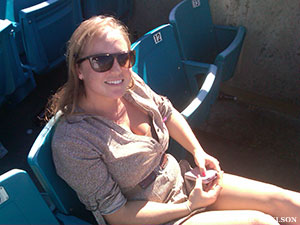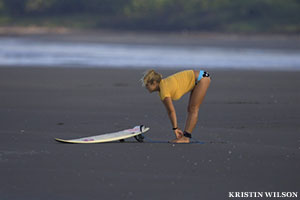
She's surrounded by hot bodies and party girls, a bunch of surfers soaking in the sun in the waning minutes of a Jacksonville Jaguars game. She knows most of them, smiling behind her shades as they show skin and affection the way so many beachgoers do. To a stranger, she seems just like one of them -- another young American with too much time spent on a tan and too little time spent at work. And in a way, she is like them -- she was a pro surfer too, hanging ten for sport and hanging out for a living. But in another way, Kristin Wilson is completely different from all the other surfers. She is an entrepreneur, a business woman, a money-making author of her very own American dream. And what's funny is, her American dream has nothing to do with surfing. It doesn't even take place in America.
We go from sun-drenched Jacksonville a few Sundays ago to a dark room in Las Vegas a few months ago, where a few college-age men sat stone-faced at their computers. This is a scene that used to take place everywhere in America, every day -- young men (and some women) playing online poker. For many, it was a hobby. For some, a growing addiction. For these guys, from North Carolina State University, it was a job. And then, on April 15 of this year, the unthinkable took place.
"I was actually playing when it happened," says Nick Hatley. "The Department of Justice had seized the websites."
The FBI had shut down three of the biggest online poker sites, alleging the owners had laundered money and defrauded banks to skirt gambling laws. Poker players are nothing if not resourceful, so Hatley and his friends started looking at other sites. Surely there was a way around this.
"When PokerStars stopped letting players open new tables," Hatley says, "I knew there was a serious problem."

Panic set in. This wasn't just a temporary power outage; some players had hundreds of thousands of dollars sitting in the coffers of these companies. Poker agent Brian Balsbaugh later told CNBC's Darren Rovell, "It happened, it happened fast and it completely annihilated what was a flourishing industry in the United States."
It came to be called Black Friday. And suddenly thousands of online poker players had to choose their country or their main source of income.
Hatley left for Canada in May, but immigration rules forbid staying for more than six months out of a particular year. So he was stuck.
"Then," he says, "we found Kristin."
Kristin Wilson is the last person you'd think could be a poker pied piper. She has never played. She doesn't even own a deck of cards. And beyond that, surfing seems about the least appropriate sport to prepare for a career in poker. Surfers are up before dawn, eating perfectly, soaking up the rays and allowing the rhythm of the waves to wash all stresses away. Online poker players are up all night, eating whatever, staring at their screens until the adrenaline withers their nerves away.
But Wilson, 29, never really fit in perfectly with surfers either. She was a cheerleader who had an interest in quantum physics. She studied and surfed in Costa Rica before graduating from the University of Central Florida in 2004, and got her MBA in '05. Surfing was something she was good at -- something she actually moved back to Costa Rica to do after getting her business degree -- but she didn't want to do it forever.

Her true calling happened almost randomly. She met several people in Costa Rica who worked in sports books, which are huge there. She kept in touch. And on April 15 of this year, she read countless cries of desperation on her Twitter and Facebook feeds. Several mentioned the idea of going to Costa Rica. She knew the terrain. She spoke Spanish. She could help.
"So I just started emailing people," she says. "I figured I should just do this as a business. Not many people were equipped to just pick up and move to a different country."
That was for sure. The hurdle for the poker players to relocate to Costa Rica wasn't money. They had plenty. It was logistics. And effort.
"Poker players by nature are very lazy," says Hatley. "Most people like me, they just sit in the house and play poker all day. They don't understand how to deal with life issues."
Wilson knew the type -- let's face it, surfers aren’t exactly detail-oriented either -- and she figured she could do a lot more than find these guys a place to live. How were they going to set up a bank account? How were they going to get around safely? How were they going to install a T-1 line, for that matter?
So for $1,000 a person, Wilson did pretty much everything for the transplants. She found them houses, she had them fetched at the airport, she walked them through immersion in the day-to-day culture. She even defended them to skeptical landlords who didn't want night owls as tenants. One of her clients, an online poker forum called PocketFives.com, suggested they join forces. Kristin got her own page, calling it "Poker Refugees."
And now it's a strange, platonic marriage between the refugees and the sunny blonde. "I'm their friend," Wilson says. "They call when they're having a bad day. They tell me what hand they got. They copy and paste it into an email and send."

That's the least of her self-appointed duties. She finds the exiles maid service, groceries, even places to go to find a date. She wakes up at 4:45 a.m., works out, reaches out to the next group of refugees on the way from Vegas or Canada, meets with prospective clients, and then helps whomever needs it for the rest of the afternoon and evening. She answers questions on the Poker Refugees website -- even one from a New Yorker in Denmark who has no foreign bank account but wants to play anyway. "I can still help you," she chirps.
Wilson no longer surfs, has no boyfriend, and doesn't see much of her roommate in her three-bedroom condo. Her trip home to North Florida was merely to see her folks, see some friends, and get her car fixed. "If I'm ever not working," she says," I feel guilty." She's not lonely or miserable, though -- not hardly. She's just an entrepreneur running her own start-up. She loves the challenge and the intimacy of it. In real estate, you're just an agent. In this kind of thing, you matter.
"It would be impossible without Kristin," says poker refugee Mazin Khoury. "If you spoke Spanish, you'd have a better chance. But we don't."
If you think this little enterprise is somehow un-American -- a Florida girl getting paid to help gamblers go off-shore to make a mint -- consider that the poker exiles pay tens of thousands of dollars in taxes to the U.S. government. They wouldn't be paying anywhere near as much if they lived at home. Wilson is hardly patting herself on the back, but when you add up dozens of poker players each making tens or hundreds of thousands, her service is funneling the U.S. government a rather large amount of money. "I still pay taxes," she says. "We're all contributing members of society. We're not complaining or living off the government."
And that's why pretty much everyone thinks this situation won't last. There are too many millions -- even billions -- at stake. "I'm still sticking to the notion in my head we'll have poker back," says Khoury. "There's too much money to be made by these companies and the U.S. government. It just seems like how can something not get done when it's a billion dollar industry."

Kristin's fine with that. She says when that time comes, she'll just move on to something else. That's the surfer in her -- ride every wave until the end and don't look back. For now, she'll be up late at night, taking calls from her new clients, trying to empathize with a bad deal or a bad hand.
"What am I supposed to say?" she jokes. "I just tell them they'll get it back."
Hearing that makes the poker refugees feel better. Because, after all, Kristin's already gotten it back for them.
Popular Stories On ThePostGame:
-- Tilted World: The Broken Faith In Online Poker
-- Video: Flare Surfing Is Both The Coolest And The Hottest Thing On Water
-- MLB Veteran Survives Near-Fatal Surfing Injury




